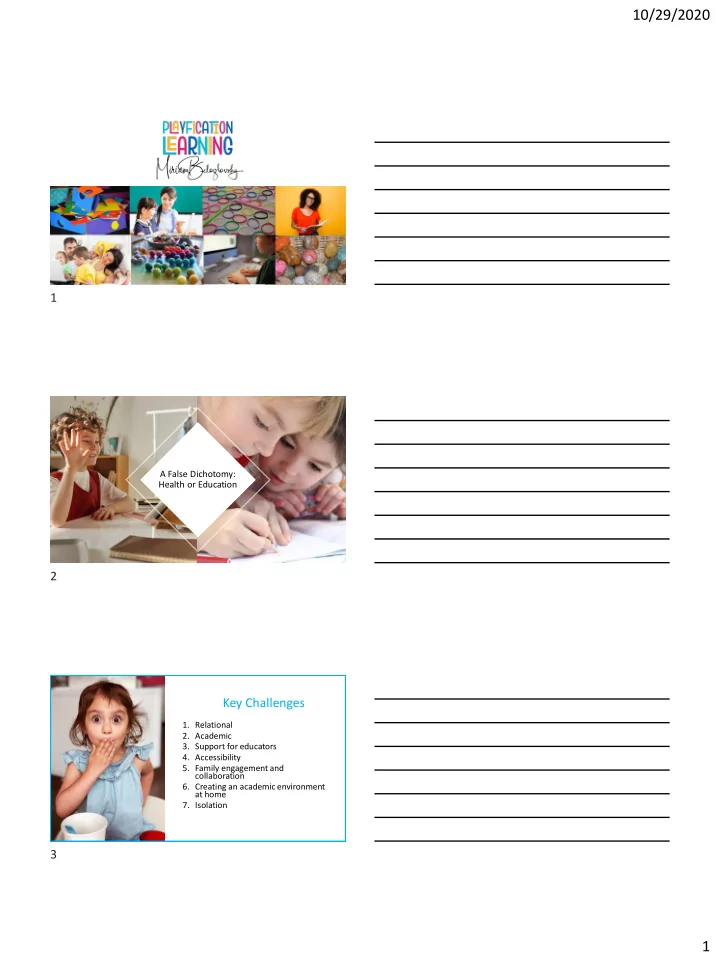

10/29/2020 1 A False Dichotomy: Health or Education 2 Key Challenges 1. Relational 2. Academic 3. Support for educators 4. Accessibility 5. Family engagement and collaboration 6. Creating an academic environment at home 7. Isolation 3 1
10/29/2020 4 Take Care of Yourself • Recognize your feelings: • Loss • Fear • Disequilibrium • Draw on your creativity and experience • Create a safe and defined space for – Your Physical and Emotional self 5 • Ask for help Edu ducator or • You don’t need to know everything – Share Sup uppor ort funds of knowledge • Become a researcher with childre n 6 2
10/29/2020 • Engage your creativity The Power of • Be innovative our Profession • Take risks • Embrace the challenge 7 8 9 3
10/29/2020 Rela elationships Fir irst • With children • With Peers • With Families • With Colleagues 10 Lesson ons from om Mr Mr. Rog ogers 11 Promote a welcoming environment where children thrive 12 4
10/29/2020 Create Rituals and Routines 13 Children need to know that the person they see on the screen cares about them! 14 Focus on What is Essential • Decide on the knowledge children absolutely need to acquire and what skills they need to grow and develop • Create opportunities for active exploration • Invite children to share their discoveries 15 5
10/29/2020 Take Care of Families • Align Expectations NOT rules • Invite them to learn with the children • Recognize family dynamics • Respect culture 16 Know the children and families. • Learn about their values, histories, and traditions • Send surveys ahead of time, spend time just learning about each other • Decide ahead of time what you are willing to share about yourself 17 Limit Screen Time 18 6
10/29/2020 Access to Technology Families may have one table or computer that is being shared by more than one person 19 Connectivity Offer flexibility or alternatives for students to access materials online, for instance sharing PDFs instead of videos that require more bandwidth 20 Focus on children’s interest and Ideas Let them play! 21 7
10/29/2020 Collecting Loose Parts at Home Go on walks and collect the gifts of nature 22 Collecting Loose Parts at Home Go on a scavenger hunt at home and find ordinary objects to use in play and learning 23 Types of Loose Parts Found at Home Invite families to collect loose parts around the house that children can use to: • Build • Design • Create • Explore their feelings and ideas 24 8
10/29/2020 Using Loose Parts to Promote Learning Use leaves for exploring scientific thinking 25 Using Loose Parts to Promote Learning Use rocks to compare and contrast attributes 26 Using Loose Parts to Promote Learning Water bottles to explore light and refraction 27 9
10/29/2020 Using Loose Parts to Promote Learning Use cups, paper plates and cardboard tubes to explore engineering 28 Using Loose Parts to Promote Learning Use cans to explore building and construction 29 Using Loose Parts to Promote Learning Cooking utensils to explore sound, pitch and rhythm – Precursors to reading 30 10
10/29/2020 Using Loose Parts to Promote Learning Use loose parts to explore storytelling 31 Using Loose Parts to Promote Learning Explore the meaning of print 32 Using Loose Parts to Promote Learning Use tile and glass beads to explore design thinking 33 11
10/29/2020 Using Loose Parts to Promote Learning Use paper to explore the elements of art 34 Using Loose Parts to Promote Learning Explore mathematical thinking 35 Using Loose Parts to Promote Learning Invite children to take photos of their collections to share with the class on the next virtual meeting 36 12
10/29/2020 Playing with Loose Parts – Making Connections to Standards and curriculum 37 Support children’s development of mathematical and scientific thinking 38 Allow children to practice their first literacy behaviors and language in ways that make sense to them. Roskos & Neuman 39 13
10/29/2020 Provide an avenue to express experiences, insights, and discoveries. 40 Foster valuable dispositions that strengthen children’s intellectual and academic capacities 41 Most Importantly: We must stay true to our belief that children learn best through play! 42 14
10/29/2020 With your passion for teaching, your commitment to Children and our support, together we can create engaging and creative virtual learning! Join us and register to get our newsletter! https://www.playficationlearning.com/ 43 15
Recommend
More recommend